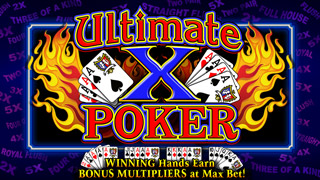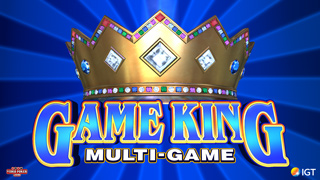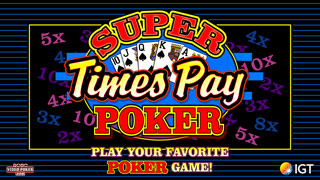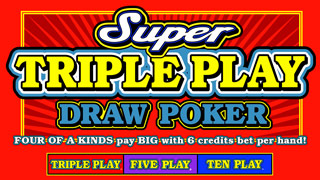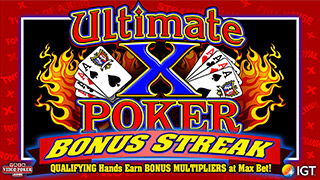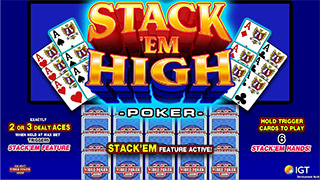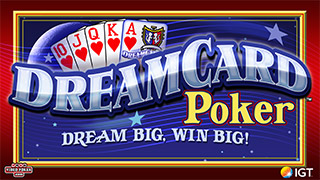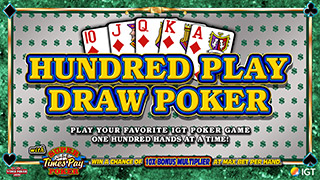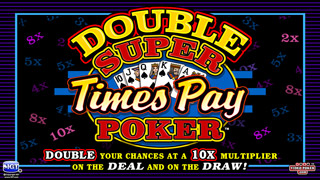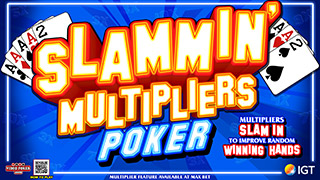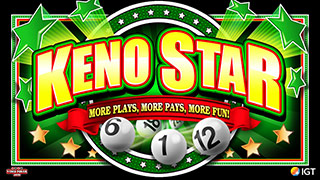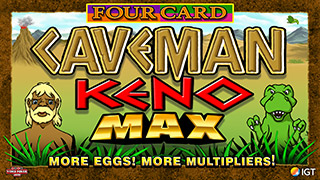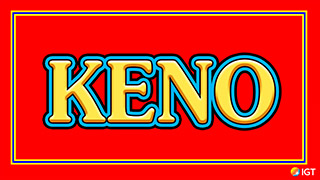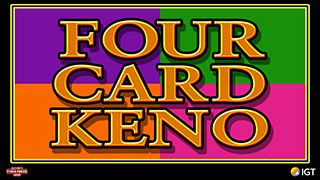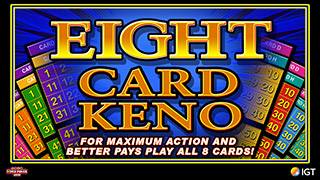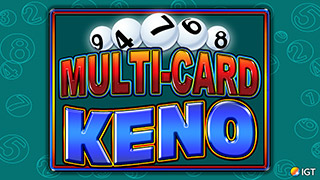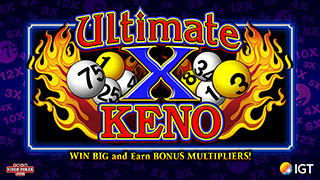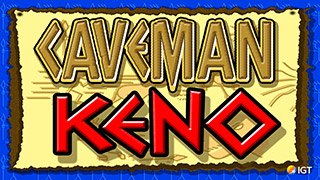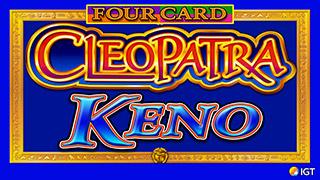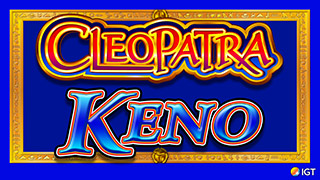Which pay table should I select for practice?
-
elmoo168
- Forum Newbie
- Posts: 9
- Joined: Mon Nov 12, 2007 2:25 pm
Which pay table should I select for practice?
Hi,
At the casino where I go to, Mohegan Sun in CT, the best pay table games (9/6 DDB or 9/5 JoB) can be found mostly at the bars but are usually busy so the remaining games are lower payback, like 9/5 less DDB and 8/5 or less JoB which I sometimes play while waiting for the better payback machines to open up. Which pay table should I practice with on VPW if I don't want to learn every variation? For example, with DDB if I might play anywhere in the range 9/6 to 8/5, should I practice with 9/6 or 8/5 to cover the different pay tables, or are the differences so slight it doesn't matter?
Thanks!
At the casino where I go to, Mohegan Sun in CT, the best pay table games (9/6 DDB or 9/5 JoB) can be found mostly at the bars but are usually busy so the remaining games are lower payback, like 9/5 less DDB and 8/5 or less JoB which I sometimes play while waiting for the better payback machines to open up. Which pay table should I practice with on VPW if I don't want to learn every variation? For example, with DDB if I might play anywhere in the range 9/6 to 8/5, should I practice with 9/6 or 8/5 to cover the different pay tables, or are the differences so slight it doesn't matter?
Thanks!
-
Eduardo
- Video Poker Master
- Posts: 2967
- Joined: Thu Aug 31, 2006 7:19 pm
I practice on the better pay table, but view the strategy chart for both of them and make a note of the differences to take with you. There should only be a few holds that are different but it is good to know what they are when you are sitting at the specific machine.
-
clwn2
- Senior Member
- Posts: 192
- Joined: Wed Jul 25, 2007 12:35 am
Hi,
At the casino where I go to, Mohegan Sun in CT, the best pay table games (9/6 DDB or 9/5 JoB) can be found mostly at the bars but are usually busy so the remaining games are lower payback, like 9/5 less DDB and 8/5 or less JoB which I sometimes play while waiting for the better payback machines to open up. Which pay table should I practice with on VPW if I don't want to learn every variation? For example, with DDB if I might play anywhere in the range 9/6 to 8/5, should I practice with 9/6 or 8/5 to cover the different pay tables, or are the differences so slight it doesn't matter?
Thanks!
Hi, I faced the same problem myself because I only play DDB . The Indian casinos in Cally that I go to have 9/6 and 9/5 and 8/5. Initially I learned the 9/6 strategy perfectly which incidentaly is correct for the very rare full pay schedule 10/6 DDB. I figured that I would not bother with the
differences with the strategy between 9/6 and the lower pay schedules.
Nowadays, since I have become more educated over the years with regards to Video Poker play and the effects of bad judgement on my
bankroll I have changed my personal strategy somewhat. 9/6 DDB is just under 99% payback percentaqe. This is low enough to be avoided by most knowledgable players. A move down to 9/5 DDB is better than a 1%
drop and 8/5 is so bad it is not even available on VPFW. To answer your original question there are strategy differences between 9/6 and 9/5 and 8/5. They have to do with flush holds since the full house is worth less in each case. For me it is too much to try to memorize the differences since there are few occasions where I will play them. For example, I will play that schedule on a progressive(I am a sucker for progressives).
If you are not in Nevada you are probably not lucky enough to have real good plays near you so you have to choose from the best plays available.
What I do is learn the strategy for the best pay schedule and try to stick to that one if possible. I try to limit my play on lesser schedules.
Hope this answers your question...
At the casino where I go to, Mohegan Sun in CT, the best pay table games (9/6 DDB or 9/5 JoB) can be found mostly at the bars but are usually busy so the remaining games are lower payback, like 9/5 less DDB and 8/5 or less JoB which I sometimes play while waiting for the better payback machines to open up. Which pay table should I practice with on VPW if I don't want to learn every variation? For example, with DDB if I might play anywhere in the range 9/6 to 8/5, should I practice with 9/6 or 8/5 to cover the different pay tables, or are the differences so slight it doesn't matter?
Thanks!
Hi, I faced the same problem myself because I only play DDB . The Indian casinos in Cally that I go to have 9/6 and 9/5 and 8/5. Initially I learned the 9/6 strategy perfectly which incidentaly is correct for the very rare full pay schedule 10/6 DDB. I figured that I would not bother with the
differences with the strategy between 9/6 and the lower pay schedules.
Nowadays, since I have become more educated over the years with regards to Video Poker play and the effects of bad judgement on my
bankroll I have changed my personal strategy somewhat. 9/6 DDB is just under 99% payback percentaqe. This is low enough to be avoided by most knowledgable players. A move down to 9/5 DDB is better than a 1%
drop and 8/5 is so bad it is not even available on VPFW. To answer your original question there are strategy differences between 9/6 and 9/5 and 8/5. They have to do with flush holds since the full house is worth less in each case. For me it is too much to try to memorize the differences since there are few occasions where I will play them. For example, I will play that schedule on a progressive(I am a sucker for progressives).
If you are not in Nevada you are probably not lucky enough to have real good plays near you so you have to choose from the best plays available.
What I do is learn the strategy for the best pay schedule and try to stick to that one if possible. I try to limit my play on lesser schedules.
Hope this answers your question...
-
New2vp
- Video Poker Master
- Posts: 1881
- Joined: Mon Sep 11, 2006 4:02 am
Hi,
At the casino where I go to, Mohegan Sun in CT, the best pay table games (9/6 DDB or 9/5 JoB) can be found mostly at the bars but are usually busy so the remaining games are lower payback, like 9/5 less DDB and 8/5 or less JoB which I sometimes play while waiting for the better payback machines to open up. Which pay table should I practice with on VPW if I don't want to learn every variation? For example, with DDB if I might play anywhere in the range 9/6 to 8/5, should I practice with 9/6 or 8/5 to cover the different pay tables, or are the differences so slight it doesn't matter?
Thanks!
There are generally more changes in strategy when the payout for the flush or straight changes than when the payout for the full house changes. And the strategy changes due to a change in the straight payout are usually more important than those for a flush in their effect on EV. When the full house payout changes, the two areas that may have the most impact are (1) whether to hold a pair of aces vs. two pairs and (2) whether to hold trip aces (and rarely trip 2s-4s) vs. a dealt full house. So to reduce your work, just check those couple of holds.
If you wish to minimize the number of strategies that you need, learn the one for the flush and straight payouts that you play most often. Much more of the increase in EV for a 1-coin change in one line of a machine with a better pay schedule is from the pay schedule itself rather than from any strategy changes.
Often the amount lost in EV is less than the amount lost due to ignoring what are called penalty card situations, which a lot of experts suggest is OK. For example, for the common variations of Jacks or Better (9/6, 9/5, 8/6, 8/5, 7/5, 6/5), no matter which of the pay schedules determine the strategy that you use, the EVs for each particular strategy will be less than 0.01% from optimal. When playing for quarters, this is expected to be less than 1/80th of a cent per play or less than 12 1/2 cents per hour if you are super fast and can play 1000 hands per hour.
With Double Double Bonus, the effects on the strategy are more pronounced if you use a strategy from a different pay schedule. Here analysis of the common pay schedule differences in full houses and flushes shows differences from optimal EV of from 0.02% up to 0.07% dependent on which of the strategies that you use (9/6, 8/6, 9/5, 8/5, 7/5, 6/5); this loss is still expected to be less than 88 cents per hour at most even if you can play 1000 hands per hour. But if you see a pay schedule where the payout for the straight is moved from 4 to 5 (like 8/6/5), using the wrong strategy can cost you more like 0.12%.
If you want to learn only one strategy per type of machine, pick the one for the flush and straight payout that you play most often.
At the casino where I go to, Mohegan Sun in CT, the best pay table games (9/6 DDB or 9/5 JoB) can be found mostly at the bars but are usually busy so the remaining games are lower payback, like 9/5 less DDB and 8/5 or less JoB which I sometimes play while waiting for the better payback machines to open up. Which pay table should I practice with on VPW if I don't want to learn every variation? For example, with DDB if I might play anywhere in the range 9/6 to 8/5, should I practice with 9/6 or 8/5 to cover the different pay tables, or are the differences so slight it doesn't matter?
Thanks!
There are generally more changes in strategy when the payout for the flush or straight changes than when the payout for the full house changes. And the strategy changes due to a change in the straight payout are usually more important than those for a flush in their effect on EV. When the full house payout changes, the two areas that may have the most impact are (1) whether to hold a pair of aces vs. two pairs and (2) whether to hold trip aces (and rarely trip 2s-4s) vs. a dealt full house. So to reduce your work, just check those couple of holds.
If you wish to minimize the number of strategies that you need, learn the one for the flush and straight payouts that you play most often. Much more of the increase in EV for a 1-coin change in one line of a machine with a better pay schedule is from the pay schedule itself rather than from any strategy changes.
Often the amount lost in EV is less than the amount lost due to ignoring what are called penalty card situations, which a lot of experts suggest is OK. For example, for the common variations of Jacks or Better (9/6, 9/5, 8/6, 8/5, 7/5, 6/5), no matter which of the pay schedules determine the strategy that you use, the EVs for each particular strategy will be less than 0.01% from optimal. When playing for quarters, this is expected to be less than 1/80th of a cent per play or less than 12 1/2 cents per hour if you are super fast and can play 1000 hands per hour.
With Double Double Bonus, the effects on the strategy are more pronounced if you use a strategy from a different pay schedule. Here analysis of the common pay schedule differences in full houses and flushes shows differences from optimal EV of from 0.02% up to 0.07% dependent on which of the strategies that you use (9/6, 8/6, 9/5, 8/5, 7/5, 6/5); this loss is still expected to be less than 88 cents per hour at most even if you can play 1000 hands per hour. But if you see a pay schedule where the payout for the straight is moved from 4 to 5 (like 8/6/5), using the wrong strategy can cost you more like 0.12%.
If you want to learn only one strategy per type of machine, pick the one for the flush and straight payout that you play most often.
-
shadowman
- Video Poker Master
- Posts: 3587
- Joined: Mon Oct 23, 2006 5:42 pm
Very good explanation. If anyone runs into these types of situations for other games a good place to consult is:
http://www.videopokerhelp.net/strategy.html
http://www.videopokerhelp.net/strategy.html
-
elmoo168
- Forum Newbie
- Posts: 9
- Joined: Mon Nov 12, 2007 2:25 pm
Thank you all for the tips! I guess being lazy and not looking at the differences in strategy for the different pay tables will bite me in the behind sooner or later.
-
details
- Forum Regular
- Posts: 60
- Joined: Fri Sep 01, 2006 4:50 pm
elmoo168 I play at the sun . I have found SA 7/5 98.85 on multiline which is not bad for a multiline game.



